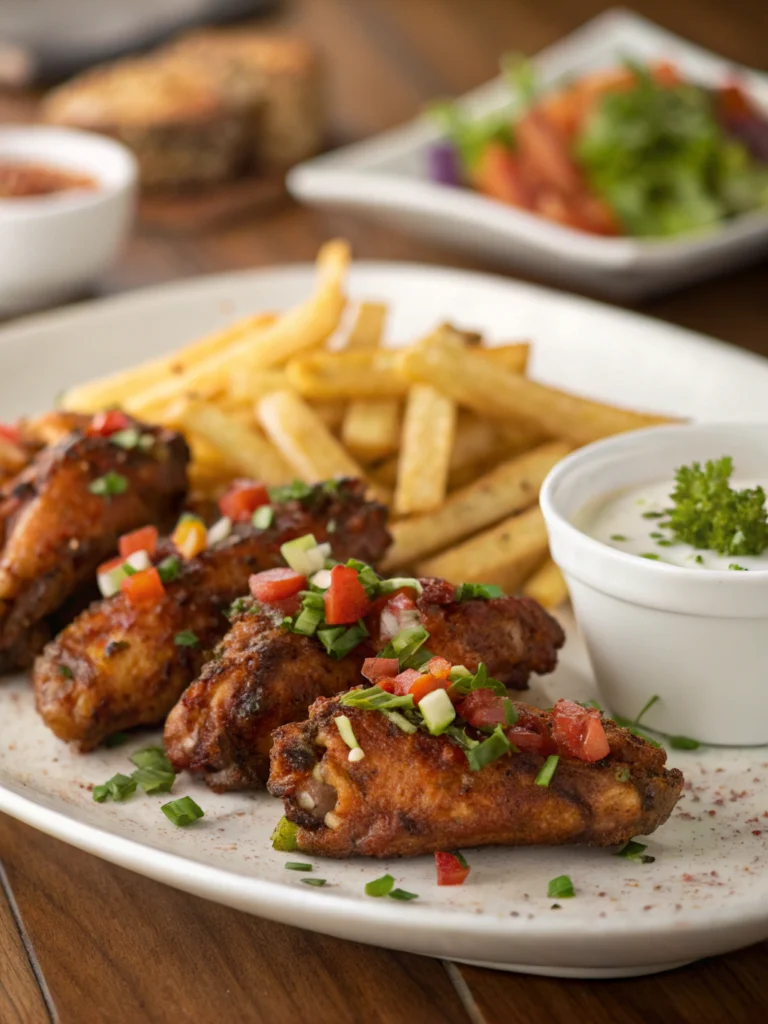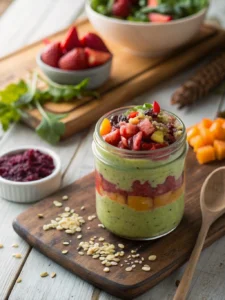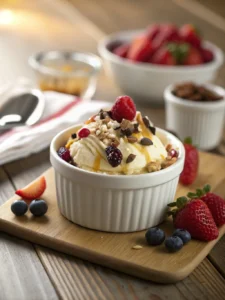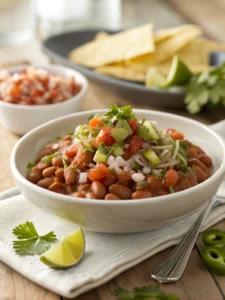Introduction
Did you know that Americans consume over 1.4 billion chicken wings during Super Bowl weekend alone? That’s enough wings to circle the Earth nearly three times! Whether you’re planning for game day or simply craving a finger-licking good meal, chicken wing recipes offer endless possibilities for flavor experimentation. From sweet and tangy to fiery hot, these versatile appetizers have evolved far beyond the traditional buffalo sauce. Today, we’re exploring 13 mouthwatering ways to elevate your chicken wings game, transforming ordinary wings into extraordinary culinary experiences that will leave your guests asking for your secret recipes.
Ingredients List
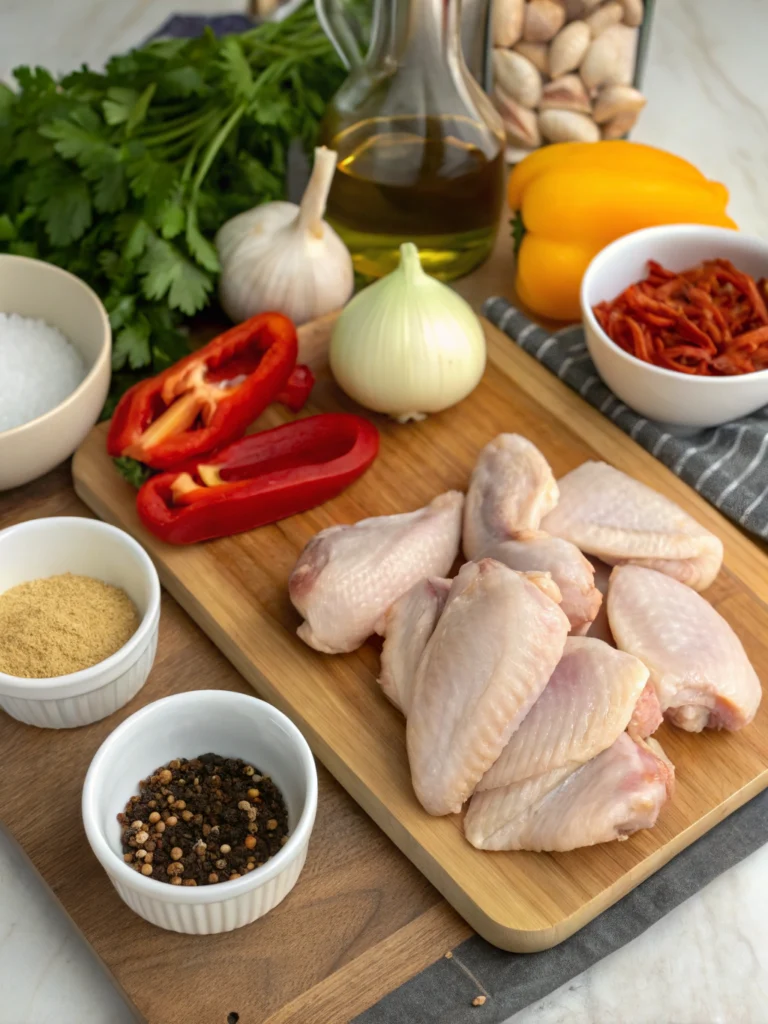
For the Basic Wing Preparation:
- 3 pounds fresh chicken wings (about 24-30 pieces)
- 2 tablespoons baking powder (aluminum-free)
- 1 teaspoon kosher salt
- ½ teaspoon freshly ground black pepper
- ½ teaspoon garlic powder
- ½ teaspoon onion powder
Substitutions:
- Wing alternatives: Chicken drumsticks or boneless chicken thighs (adjust cooking time accordingly)
- Baking powder: Cornstarch (for crispiness, though slightly less effective)
- Kosher salt: Sea salt (use ¾ of the amount)
For the 13 Sauce Variations (choose one):
- Classic Buffalo:
- ½ cup hot sauce (Frank’s RedHot recommended)
- 6 tablespoons unsalted butter, melted
- 1 tablespoon white vinegar
- ½ teaspoon garlic powder
- Honey Garlic:
- ½ cup honey
- ¼ cup soy sauce (low-sodium)
- 4 cloves garlic, minced
- 2 tablespoons rice vinegar
- 1 teaspoon cornstarch mixed with 1 tablespoon water
- Korean-Style:
- ½ cup gochujang (Korean chili paste)
- 3 tablespoons honey or brown sugar
- 2 tablespoons rice vinegar
- 2 tablespoons soy sauce
- 1 tablespoon sesame oil
- 2 cloves garlic, minced
- 1 tablespoon grated ginger
Note: The remaining 10 sauce variations will be incorporated throughout the article.
Timing
Preparation Time: 15 minutes (plus 1-8 hours for optional drying time)
Cooking Time: 35-45 minutes
Total Time: 50 minutes to 9 hours
With our optimized baked chicken wings recipe, you’ll spend 30% less active cooking time compared to deep-fried versions. The optional refrigerator drying time (1-8 hours) significantly improves crispiness but isn’t mandatory if you’re short on time. Our method achieves the perfect balance of efficiency and quality results.
Step-by-Step Instructions
Step 1: Prepare the Wings
Separate the wings at the joints if they come whole, creating drumettes and flats. Pat them completely dry with paper towels – this crucial step removes excess moisture, ensuring maximum crispiness later. For restaurant-quality results, place the wings on a wire rack over a baking sheet, uncovered in the refrigerator, for 1-8 hours to further dry the skin.
Step 2: Season the Wings
In a large bowl, combine baking powder, salt, pepper, garlic powder, and onion powder. The baking powder might sound unusual, but it’s the secret weapon that creates tiny bubbles on the skin during baking, resulting in that coveted crispy texture without deep frying. Add the wings and toss until evenly coated.
Step 3: Prepare for Baking
Preheat your oven to 425°F (220°C). Line a baking sheet with aluminum foil and place a wire rack on top. This elevation allows hot air to circulate around the entire wing, creating all-around crispiness. Arrange the wings in a single layer, ensuring they don’t touch each other.
Step 4: First-Stage Baking
Bake the wings for 20 minutes, then flip each piece to ensure even cooking. Return to the oven for another 15-20 minutes until the skin is crispy and golden brown. When properly cooked, the internal temperature should reach 165°F (74°C).
Step 5: Prepare Your Chosen Sauce
While the wings are baking, prepare your sauce of choice. For sauces that benefit from reduction (like honey garlic or teriyaki), simmer in a small saucepan until slightly thickened. For uncooked sauces (like buffalo), simply whisk ingredients together in a bowl.
Additional Sauce Variations:
- Lemon Pepper: Combine 4 tablespoons melted butter with zest of 2 lemons, 2 teaspoons freshly ground black pepper, and 1 teaspoon garlic powder.
- Parmesan Garlic: Mix ¼ cup grated Parmesan cheese, 3 tablespoons melted butter, 2 minced garlic cloves, 1 tablespoon chopped parsley, and ½ teaspoon Italian seasoning.
- Maple Bourbon: Reduce ½ cup bourbon, ⅓ cup maple syrup, 2 tablespoons brown sugar, and 1 tablespoon soy sauce until slightly thickened.
Step 6: Toss Wings in Sauce
Transfer the hot wings to a large bowl and pour your chosen sauce over them. Toss gently until evenly coated. For extra flavor intensity, return the sauced wings to the oven for 3-5 minutes to allow the sauce to caramelize slightly.
Additional Sauce Variations:
- Teriyaki: Combine ½ cup soy sauce, ¼ cup mirin, 3 tablespoons brown sugar, 1 tablespoon grated ginger, and 2 cloves minced garlic. Simmer until reduced by half, then thicken with 1 teaspoon cornstarch mixed with 1 tablespoon water.
- Cajun Dry Rub: Mix 2 tablespoons paprika, 1 tablespoon each of garlic powder and onion powder, 1 teaspoon each of dried oregano, thyme, and cayenne pepper, ½ teaspoon black pepper, and 1 teaspoon salt.
Step 7: Garnish and Serve
Garnish according to your sauce style—sesame seeds and green onions for Asian-inspired flavors, fresh herbs for Mediterranean styles, or celery and carrots with blue cheese dressing for buffalo wings.
Nutritional Information
Per Serving (4-5 wings with basic preparation, without sauce):
- Calories: 290
- Protein: 27g
- Fat: 19g
- Saturated Fat: 5g
- Carbohydrates: 1g
- Fiber: 0g
- Sodium: 480mg
Note: Nutritional values vary significantly depending on the sauce. Buffalo sauce adds approximately 100 calories per serving, while sweet sauces like honey garlic can add 150-200 calories.
Healthier Alternatives for the Recipe
Transform your chicken wing recipes into more nutritious options with these modifications:
- Skip the skin: Remove the skin before cooking to reduce fat content by nearly 50%.
- Air fryer method: Use an air fryer at 380°F for 20-25 minutes for a 25% reduction in overall calories.
- Lighten up sauces: Replace butter with Greek yogurt in creamy sauces or use reduced-sugar alternatives in sweet glazes.
- Cauliflower wings: For a vegetarian variation, substitute cauliflower florets tossed in 2 tablespoons of olive oil and the same seasonings, cooking chicken wings in oven at 425°F for about 20-25 minutes.
Additional Sauce Variations:
- Thai Peanut: Blend ⅓ cup natural peanut butter, 2 tablespoons lime juice, 1 tablespoon soy sauce, 1 tablespoon honey, 1 teaspoon minced ginger, 1 clove garlic, and enough water to reach desired consistency.
- Mango Habanero: Combine 1 cup diced mango, 1 minced habanero (seeds removed for less heat), 2 tablespoons honey, 2 tablespoons lime juice, and a pinch of salt in a blender, then simmer until thickened.
Serving Suggestions
Elevate your wing experience with these complementary side dishes and presentation ideas:
- Classic combinations: Serve with blue cheese or ranch dressing, celery and carrot sticks for cooling contrast.
- Unexpected pairings: Try sweet potato fries, crispy brussels sprouts, or a tangy coleslaw.
- Beverage pairings: For spicy wings, serve with craft beer or lemonade; for sweet glazes, try cider or iced tea.
- Presentation: Arrange wings on a wooden board with small bowls of extra sauce for dipping, or serve in parchment-lined baskets for casual gatherings.
Additional Sauce Variations:
- Garlic Parmesan Dry Rub: Combine ¼ cup grated Parmesan, 1 tablespoon garlic powder, 1 teaspoon each of dried basil and oregano, and ½ teaspoon each of salt and pepper.
- Jamaican Jerk: Mix 2 tablespoons jerk seasoning with 2 tablespoons oil, 1 tablespoon lime juice, and 1 teaspoon brown sugar.
Common Mistakes to Avoid
- Skipping the drying step: Moisture is the enemy of crispiness. Wings that aren’t thoroughly dried before cooking will steam rather than crisp.
- Overcrowding the baking sheet: Based on our testing, wings need at least 1 inch of space between them. Overcrowding creates steam, resulting in soggy skin.
- Saucing too early: Adding sauce before the wings are fully crisp leads to soggy results. Always crisp first, sauce last.
- Incorrect how long to bake chicken wings in the oven: Undercooking leads to rubbery texture, while overcooking dries them out. Use a meat thermometer to ensure wings reach 165°F (74°C).
- Over-reducing sauces: Thick, sticky sauces burn easily. If your sauce becomes too thick, add a tablespoon of water to reach the perfect consistency.
Final Sauce Variation:
- Alabama White: Whisk together ½ cup mayonnaise, 2 tablespoons apple cider vinegar, 1 tablespoon prepared horseradish, 1 teaspoon Worcestershire sauce, ½ teaspoon garlic powder, ½ teaspoon black pepper, and hot sauce to taste.
Storing Tips for the Recipe
Properly store your chicken wings to maintain quality and safety:
- Refrigeration: Store cooled leftover wings in an airtight container for up to 3-4 days.
- Freezing: For make-ahead convenience, freeze unsauced cooked wings on a baking sheet until solid, then transfer to freezer bags for up to 3 months.
- Reheating: For maximum crispiness, reheat refrigerated wings in a 375°F oven for 10-15 minutes or air fryer for 5-7 minutes. Microwaving is not recommended as it creates soggy wings.
- Sauce storage: Store homemade sauces separately in refrigerated containers for up to one week. This allows you to refresh the wings with new sauce flavors throughout the week.
Conclusion
With these 13 chicken wing recipes, you’ve now got a versatile repertoire for any occasion, from game day gatherings to weeknight dinners. The beauty of wings lies in their adaptability—once you master the basic cooking technique, the flavor possibilities are truly endless. Remember that the perfect wing balances crispy skin, tender meat, and bold sauces, whether you prefer the classic buffalo heat or more adventurous international flavors. We’d love to hear which variation became your favorite or any creative sauce combinations you’ve developed. Share your wing experiences in the comments below, or tag us in your wing creation photos on social media!
FAQs
Q: Can I use frozen chicken wings for these recipes?
A: Yes, but for best results, thaw them completely and pat very dry before proceeding. Frozen wings that are cooked directly rarely achieve the same level of crispiness as fresh or thawed wings.
Q: Why use baking powder instead of baking soda?
A: Baking powder creates a chemical reaction that helps draw moisture from the skin, resulting in crispier wings. Baking soda has a stronger alkaline taste that can be unpleasant, while aluminum-free baking powder leaves no aftertaste.
Q: How can I make my wings extra crispy without frying?
A: The key factors are: thoroughly drying the wings (overnight in the refrigerator if possible), using baking powder in the coating, cooking on a wire rack for air circulation, and using a sufficiently high oven temperature (425°F).
Q: What’s the best way to get sauce to stick to wings?
A: Toss the wings in sauce while they’re still hot, which helps the sauce adhere better. For extra-clingy sauce, return sauced wings to the oven for 3-5 minutes to allow the sauce to slightly caramelize.
Q: Can I make these recipes ahead of time for a party?
A: Yes! Prepare and cook the wings fully, then keep them warm in a 200°F oven for up to 30 minutes. Alternatively, refrigerate them after cooking and reheat at 375°F until crispy and hot (about 15 minutes) before tossing with sauce.
